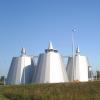Energy lending in south-eastern Europe
South-eastern Europe is riddled with poor planning and corruption in the energy sector and its governments are proving slow to react to the challenges and opportunities offered by the decarbonisation agenda.

Above: planned coal power plants in south-eastern Europe
This should be an opportunity for international lenders like the EBRD, the EIB and the World Bank to promote energy efficiency and sustainable renewables to shift the region's energy sectors towards lower carbon emissions.
So far, however, it is only happening in a few positive exceptions as our study and the projects that we monitor show.
The damaging Projects of Energy Community Interest (click to see full size)
Note: This infographic is out of date. It contains projects that were not accepted as priority projects. For comparison, see the final list of approved PECIs.
The European Energy Community
The European Energy Community was established between the EU and a number of third countries in order to extend the EU internal energy market to south-eastern Europe and beyond. (Members include the EU, Albania, Bosnia and Herzegovina, Croatia, Macedonia, Montenegro, Serbia, Moldova, Kosovo, plus Ukraine.)
The Community's priority projects, however, are set to include several environmentally damaging coal and hydropower projects that will be fast-tracked for financing over the next years.
Read more:
Dirty power plants in Europe's Neighbourhood set to become EU priority
Press release | October 22, 2013
Western Balkans and Ukraine: EC-backed Energy Community to prioritise coal plants that threaten EU long-term climate targets (pdf)
Briefing | October 22, 2013
Related news




China in the Western Balkans
China has risen to become a major player in the dam building business and is appearing ever more frequently in central and eastern Europe.
Read more:
Doing more than just spotting the elephant: a new resource for campaigning on China, dams and finance
Blog post | November 27, 2012
Report on lending figures
Download the report
More publications
- Briefing | October 2, 2014
- Briefing | October 2, 2014
- Briefing | September 24, 2014





